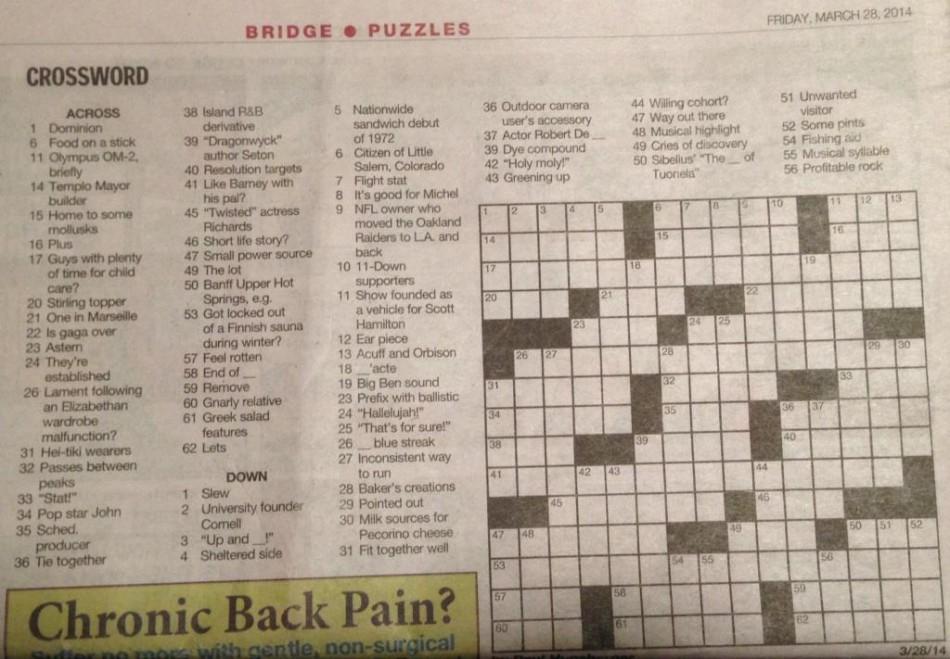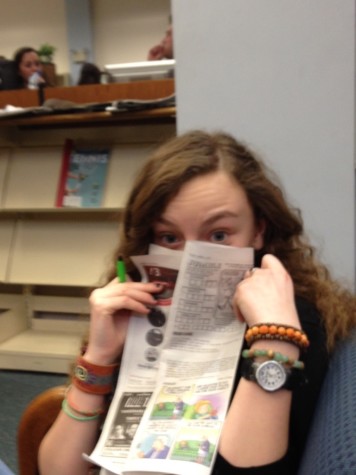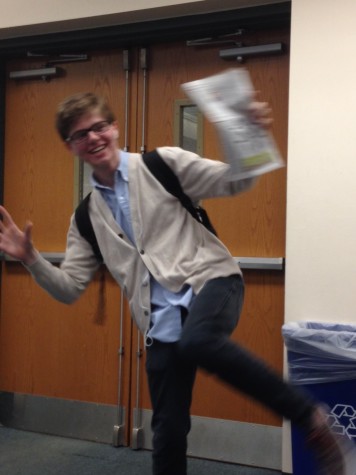Filling in the blanks
April 21, 2014
The crossword puzzle; quite possibly the most widespread word puzzle still around, has been with us from its humble beginnings in England during the late nineteenth century, its first appearance in America in 1913, through the near-fanatical crossword craze that arose during the 1920s in the United States to its now cozy niche towards the end of the Arts, Better Living, or some similar section of the daily newspaper (next to the horoscopes and Bridge puzzles).
Here — hidden just far enough from view that it should only be seen by the exceptionally bored, exceptionally curious, or exceptionally devoted reader — is where we begin.
So, let us solve this crossword puzzle: one of two crossword puzzles that can be found in The Record from Friday March 28th, 2014.

Some think it best to scour the clues in number order and then ponder on each until they either have the answer or simply cannot think anymore.
But, rather than using that method, I will simply move from clue to clue giving the reader a feel for how the crossword works when practiced.
The clue that catches my eye first is a fairly simple one, number 21 across, One in Marseille. This clue formula, or paradigm, is found very often in crosswords and almost every single time can be broken down as follows:
The first solution (in this case one) is translated in the language of the city, state, country, etc. (in this case in Marseille). Therefore, Marseille being a city in southern France, the answer is UNE, the French word for one.
If the reader has comprehended this “crossword logic” so far then it is important to explain that this is still quite simple, and the reader has only scratched the surface of what kind of thinking it takes to complete a crossword in its entirety. So, now that we have 21 across filled in we can move on to something else. Common sense tells us that because we already have the N in UNE in the middle of the 18 across clue (_’acte) that we try to fill in this clue next [please reference the image above to follow along with the crossword puzzle].
The logic behind this clue is more straightforward. Simply fill in the blank that precedes the world ‘acte. It seems that the word ‘acte is not English, and the astute reader would know that it is in fact French. The answer is entr, and the phrase entr’acte, meaning ‘between the acts’, would only be known to anyone French who frequents the theatre, and is synonymous to the English ‘intermission.’
For those of you still with me at this point, you might start to think that the crossword is just a whole bunch of French, but this is not the case. To prove this we move to 34 across, Pop star John.
This clue is also simple logic: just think of a pop star named John whose other name is five letters. In this case ELTON.
Let’s mosey on over to 5 down, Nationwide sandwich debut of 1972, of which the last letter of the answer coincides with the “N” in ELTON (MCMUFFIN).
Hopefully at this point the reader can grasp the complexities and depths to which the solver of a crossword puzzle must go. All one has to do is imagine a clue like 15 across’ Home to some mollusks with answers ranging from SHELL to ATOLL to COAST (as the answer can differ from specifying the shell that a mollusk inhabits to the geographic aspect of the ocean where it resides).
Also, there seem to always be a number of clues that, though seeming to be maddeningly easy, cannot be easily determined by simple guesswork. In this puzzle the clue is 19 across Big Ben sound.
Every educated person knows Big Ben. It’s a clock! In England! Enough said, right? But what is the answer? Some might be pretty confident that their clock ‘ticks.’ TICK is four letters, and thus capable of filling the box, but might not someone else say that their clock ‘tocks?’ Another might say theirs ‘rings,’ and another still may say that a clock gongs, or bongs, or pongs. The possibilities are endless. So, unless one has a clue as to the first letter of 19 across it’s pretty much up in the air. But the first letter happens to coincide with 17 across, an answer that boasts quite a bit of letter, and is one of the harder clues.
The reader will note that there are several clues that go horizontally from one end of the crossword to the other, or very nearly so. These include: 17 across, 26 across, 41 across, and 53 across. These long answer clues typically exhibit a shared theme, pattern or syntactical structure.
No poll selected
Let’s start at 17 across: Guys with plenty of time for childcare? Any reader who immediately guesses the correct answer deserves a genius grant of some sort, but, as is usual, this clue leaves many stumped. Perhaps it is because of the broadness of the clue or maybe the length of the answer that does it. In spite of that I am sure that the reader will be happy to know that the answer to this clue is not necessarily something that is usually figured out right off the bat. The answer to these long answer clues like 17 across are usually discovered by the solving of several connecting clues. Then, when the first long-answer clue is solved and the pattern, theme, or structure of answer is discovered the rest of the clues are somewhat easier to solve.
The answer to 17 across is FREEMENANDABABY, a take on the movie Three Men and a Baby starring Tom Selleck and Ted Danson, and in this puzzle’s case the pattern to the four clues are all related by being questions with answers that are all a somewhat clever play on words. As evidenced by 26 across Lament following an Elizabethan wardrobe malfunction? THEFRILLISGONE, i.e. the thrill is gone; 41 across Like Barney with his pal? HANGINGBYAFRED, i.e. hanging by a thread; 53 across Got locked out of a Finnish sauna during winter? FROZEINTHETOWEL i.e. throws in the towel.
So, such as there can be complex patterns between clues, multiple answers to multiple clues, and multiple answers can be inferred from answers to previous clues, one notices that, if there were one wrong answer in this puzzle, it could incite a multitude of other wrong answers that can turn a fun crossword puzzle into a dizzying nightmare of scribbles, erasures, and tears. Well, not tears, but frustration nonetheless (tears would smudge the crossword puzzle!)
So, if this is the case then why go to all the trouble for a crossword? And more to the point who are the people that do so? Are they in our school? Among us? Where?
A puzzling hobby
The library is uncomfortably silent; the closest thing that could be called sound is the imperceptible hum of learning that hangs in the crushing quiet. Amidst all this quiet chaos is one of Glen Rock High School’s quieter stars of the crossword court: Amy Barenboim.
Having started only a year ago, Amy has skyrocketed to the forefront of the crossword community (albeit a relatively small community within Glen Rock High School).
But sometimes you can figure it out, and it’s… it’s a bonding ritual between people.
— Amy Barenboim
“I started doing the crosswords, somewhere around last year […] usually if it’s earlier in the week because it’s easier I can finish half [a puzzle], I have finished full ones sometimes, but normally I don’t get very many,” Amy said. Amy is modest concerning her crossword prowess, so instead we focus on her opinion of the puzzle itself.
To Amy, the crossword is an escape, an ephemeral distraction.
“I enjoy the challenge and the quest for the answer, even though 70% of the time I don’t know it,” she said. “But sometimes you can figure it out, and it’s… it’s a bonding ritual between people.”
However, to Amy, the crossword puzzle is not just a mindless activity. She embraces the crossword with zeal, though the drive toward completing the puzzle does not consume her. It comes with a certain carelessness and ease that is only indicative of the most talented of wordsmiths.
The mere puzzle aspect of the crossword isn’t the only thing about the crossword that Amy holds dear.
“It’s…it’s a bonding ritual between people,” Amy said. “You can sit and you can drink your coffee, and you can do your crossword puzzle.”
Though useful as a distraction, Amy also realizes the crossword’s ability to bring people together, to prompt asking both friends and strangers alike questions like: ‘What’s a five letter word for ‘tie together?,’ ‘How long is a fortnight?,’ ‘What’s does listlessness mean?,’ and ‘What’s the Jewish version of a priest called?’ Though questions like these are occasionally grounds for alienation and exclusion, Amy finds value in these questions, which spark lively debate and engaging conversations.

Though treating the task of the crossword quite casually Amy can be surprisingly particular on her choice of crossword publisher.
“The Record, yeah!” she said. “I mean, why not? They have two, and The New York Times, and [The Record has] the funnies! Which, oh my God, are funny.”
“I really like Dilbert and Zits,” she said. She elaborated by showing me the day’s panels.
“Dilbert, because it’s witty, and it’s written by someone who actually worked at a corporation, and he knows the tortures of that profession. And Zits because it’s funny and the mom is cool, I like the mom!” Amy said. “Oh! Pickles too, because the old couple is so cute.”
When I brought up the subject of crossword logic and idiosyncrasies Amy became a bit exasperated.
“The crossword puzzle is a very neurotic entity,” she said, “Basically, the tense in which the question is asked or the clue is give, you have to answer in the same tense. So if it says […] stabs, you have to put spears, but if it says stabbed you would have to say speared. And then hyphen, when it says hyphen that means there should be a hyphen but you don’t actually write it. Then two words […] if it says Newton or Asimov you would say Isaac, but if it said Newton and Asimov you would say Isaacs. And stuff like that, it’s all very complicated…”
Whether, or not the crossword can make someone smarter is another matter entirely. Amy expresses her opinion on the matter.
“I think it makes you more creative because even if you don’t know the answer, you can figure it out just from the answers around it. But it terms of IQ… Nah,” Amy said. It would seem to suggest, merely from observation, that the use of counterintuitive logic wouldn’t do much more than increase attention to detail and memory.
In a quest to understand the crossword and its questers more, I sought out a man who is no new-comer, and whose three-year career in the crossword world has turned him into a puzzle solving superstar: Andrew Peiser.
But what I’ve learned is that life itself is a crossword puzzle — everything is interconnected, you see.
— Andrew Peiser
As I sat down with Andrew, I was immediately accosted by his serious, even grave demeanor as he stared, his eyes unwaveringly focused on the crossword on the table in front of him. It seemed for a brief moment that, though his gaze still held steady at his crossword, that he was staring right at me. It was clear in that realization that Andrew most likely held a more serious view of the crossword, and, subtly, I made a note to myself to make sure not to accidentally trivialize it.
It was difficult not to feel intimidated when he finally pushed away his crossword, and looked at me, dead-in-the-face, and said, “So you wanna know about crosswords.”
I shuddered.
When asked timidly why he did the crossword, I received only a chuckle. Just as I was about to press him for a more elaborate answer he cut me off.
“I guess just to pass the time,” Andrew said, “or I guess what you’re truly asking is ‘Why do I exist?’ But I don’t know. I just feel that a part of the cosmos needs me, that I’m necessary.”
I pressed him on his response.

“I do the crossword just about every damn day, […] one hundred and ten percent,” Andrew said, with a hint of boldness creeping into his voice, “and, well, there’s the crossword puzzle of the newspaper, and there’s the crossword puzzle of life.”
“You see,” Andrew said, “the crossword is really negligible, and I could really do without it. But what I’ve learned is that life itself is a crossword puzzle — everything is interconnected, you see.”
Like the two-dimensional crossword puzzle, life was an interconnected three-dimensional world where everything flowed seamlessly together. Like the pesky mistakes that one does not realize are there in their puzzle, the same pesky mistakes in life are those that come back to haunt us. This new take, so radically different from Amy’s perspective of the puzzle as a social tool and entertainment, introduced the puzzle as a metaphor for life was fascinating.
Unamused by trivial question about the crossword, Andrew was terse when it came to the more mundane aspects of the crossword that Amy took so much joy in. Andrew normally does the crosswords in a female-oriented magazine and The Record. Not wanting to offend, I tried a best as possibly to convey a sense of surprise and misunderstanding at Andrew’s choice of a woman’s magazine.
“Well, I have them around the house, they’re always available,” Andrew said succinctly. Truly the utilitarian, Andrew seemed unbothered of any reason to question his choice of medium for the crossword.
Andrew enjoys the crossword for two simple reasons, both very different than his previously stated reason for doing the puzzle in the first place. The first is his love of Latin roots.
“I don’t take Latin: I live and breathe Latin! The blood that runs through these veins is Latin!” His second reason is much less vigorous, “And I also enjoy when I don’t know an answer but then I get it because I get everything else around it, and I can pretend I knew it.”
Andrew’s method was another part of the crosswording process that seemed to be very distinctive.
“Well, first I reach into my subconscious next I write down the answer,” Andrew said plainly. “Sometimes I encounter frightening things in my subconscious.”
Andrew was, however, also dismissive of the idea that crosswords make you smart.
“I guess it’s like exercise for the brain; you have to think. So it doesn’t make you smarter, but it keeps you smart,” he said.
The fate of the crossword hangs in the balance. Whether or not it is phased out and replaced is unknown. Perhaps, in the not so distant future we will see it printed almost like a sort of cute homage commemorating what people used to do for fun. Though this is a best case scenario, and the most realistic might say that, as the generation of children who is now growing up surrounded by technology reaches adulthood, newspapers themselves will fade into antiquity, superseded by machines’ quicker and more efficient ability to provide us with news and entertainment.
This being said, there are crosswords available online.